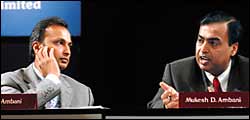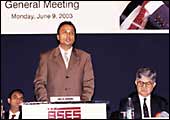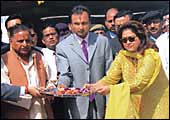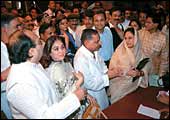 |
 |
| Mukesh Ambani: His control over Reliance
is now absolute |
Anil Ambani: Sidelined, wants his share
of the pie |
For
nine days in a row in September, Seawind, the 19-storey residence
of the Ambani family, played host to a Shanti Yagna, a Vedic ritual
usually performed to reinforce the message of peace and harmony.
Performed by the Ambanis' regular pundit from Porbandar, the Yagna
was the idea of Kokilaben, the family matriarch and wife of the
late Dhirubhai Ambani, the Founder Chairman of Reliance Industries
Ltd. (RIL). Participating in the Yagna were family members, relatives
and employees working closely with the family. Mukesh Ambani, Chairman
& Managing Director of RIL, and Anil Ambani, Vice Chairman &
Managing Director of RIL, made fleeting appearances, whenever their
busy schedules allowed them to.
Now Shanti Yagnas aren't necessarily resorted
to when tensions need to be resolved-in this case between two family
members-but peace between Mukesh and Anil would have likely been
one of the fervent prayers on the lips of Kokilaben. After all,
as RIL insiders point out, by September 2004 the brothers had stopped
talking to each other; this would have appeared unimaginable a few
years ago. After all the brothers shared such a close relationship
that they wouldn't call each other by name-Mukesh would endearingly
call Anil "bhai" and Anil would respectfully address his
elder brother as "bapu". "Anil is like a son to me..."
is what Mukesh said in an interview in August 2002 after taking
over as Chairman. As things stand today, a settlement between the
brothers is in the realm of the impossible, and Anil is said to
putting in place a comprehensive legal strategy, which will come
to light once, or if, his elder brother makes a move to relieve
him of his responsibilities and powers, and what Anil might believe
he should rightfully control in the Reliance empire. After all,
as Reliance insiders point out,
Anil and his family (wife Tina and their two
sons) control just about 1 per cent in RIL, which gives the Vice
Chairman little leverage to work towards a settlement.
| CLASH OF THE TITANS |
| POINT |
» Dhirubhai
had taken all necessary steps to separate ownership from management...
there is no ambiguity in his legacy that the Chairman and Managing
Director is the final authority on all matters concerning Reliance.
» The architecture
of the ownership of Reliance has been configured by Dhirubhai
in a framework of companies. Given this configuration, it obviates
the necessity for a will.
» Since
Dhirubhai Ambani's stewardship at the helm as Chairman, Mukesh
focusses on the project technology, operational and business
aspects. And Anil focusses on treasury and investment management
interface aspects. This arrangement continues.
» Anil is
responsible for the power initiative that comes under Reliance
Energy, a company acquired two years ago (then BSES), and Mukesh
is responsible for the Infocomm initiative of Reliance, in which
RIL has invested over Rs 12,000 crore. |
| COUNTER POINT |
»
Mukesh and Anil have functioned as equals-as Managing Directors
reporting to the board-for 20 years, so why alter that arrangement
now?
» Dhirubhai
would stress that Reliance has been built on the foundation
of relationship and trust. Mukesh is abusing his position to
usurp sweeping powers for himself. He wants Anil to function
under his authority.
» Mukesh
has falsely informed the Board of RIL that there has been absolutely
no change in the powers of Anil. But the truth is that Mukesh
wants to revoke, modify or countermand any actions or decisions
taken by Anil.
» Anil has
no shareholding in Reliance Energy, which is 50 per cent controlled
by RIL. Reliance Infocomm has apparently claimed that it is
promoted not by the Ambani family but by Mukesh Ambani personally
and RIL. |
Last fortnight, when increasing tensions between
the Chairman and Vice Chairman of the Rs 75,556-crore RIL exploded
into the public domain, with Mukesh admitting to "ownership
issues", it also became fairly clear what the friction was
all about. After spending two decades ostensibly as equals-as Managing
Directors reporting to the board of RIL-Mukesh was now apparently
preparing to make that significant leap forward, leaving his brother
one step behind. As he succinctly put it to his employees: "Our
Founder Chairman, Shri Dhirhubhai Ambani had taken all necessary
steps to separate ownership from management and has settled all
of them within his lifetime. There is no ambiguity in his legacy
that the Chairman and Managing Director is the final authority on
all matters."
This could mean two things, both not very pleasant
for the Vice Chairman: One, that if Mukesh is "the final authority
", Anil would have little choice but to function as a Director
in RIL under Mukesh's authority. And if he doesn't play ball, Mukesh
could even contemplate getting him thrown out of the board. Materially,
Anil would be left with little inheritance, certainly not RIL or
pieces of it, and perhaps not even Reliance Energy-which is 50 per
cent owned by RIL. A spokesperson for Mukesh denies any such moves
to clip Anil's wings. "Problems arise in Indian family businesses
because there's not enough to share. That's not the case here. There's
enough to keep each of the brothers busy for the next 10 years.
They have enough on their plate, and enough in their lockers."
"Enough" is a relative word, and sources
close to the Vice Chairman point out that Anil would want a "fair
division" of the assets, which would mean a 50:50 division
or thereabouts, and he feels his late father too would have wanted
it that way. For instance they point out both Anil and Mukesh got
into RIL (in 1983 and 1980, respectively) as Executive Directors,
by 1993-94, both became Joint Managing Directors (Mukesh was also
christened Vice Chairman), and that Dhirubhai had also appointed
Anil as Managing Director of Reliance Petroleum as well as Chairman
of Reliance Polyethylene and Reliance Polypropylene (both since
merged into RIL). "They were always equals, but now it seems
like Mukesh is abusing his power," says a source sympathetic
to Anil. Documents liberally circulating in the media last fortnight
served to highlight the point that a supplementary agenda was introduced
at the July 27 board meeting that proposed to "redefine the
powers of the Managing Directors," with Anil expressing surprise
that "some of the other RIL Directors, and several RIL employees,"
had been taken into confidence on the supplementary agenda... "while
I, as VC & MD, was not even informed of the same!" Analysts,
however, point out that it may not be possible for the board to
dethrone Anil as Managing Director, and if matters do come to such
a head, it will be in the hands of shareholders (at the annual general
meeting) to decide. And that perhaps could explain why internal
emails, letters to employees and confidential documents have conveniently
been making it to the front pages.
| BLOW BY BLOW |
|
1980-81: Mukesh Ambani brought
in as Executive Director at Reliance Industries.
1983-84: Anil Ambani brought
in as Executive Director at Reliance Industries.
1991-92: Mukesh is appointed
Vice Chairman, Anil appointed Joint Managing Director.
1993-94: Mukesh appointed Vice
Chairman & Joint Managing Director, Anil appointed Joint
Managing Director.
31 July 2002: Mukesh becomes
Chairman & Managing Director, Anil becomes Vice Chairman
& Managing Director.
 |
| Side by side: The brothers in 2002 |
27 July 2004: At an RIL board
meeting, powers and authorities of Mukesh and Anil redefined.
Resolved that Anil will be under the overall authority of
Mukesh.
29 & 30 July 2004: Anil
requests the Chairman in his email communications to keep
the item regarding the redefinition of powers in abeyance.
25 October 2004: Anil once again
expresses his views on the draft minutes of the 27 July 2004
board meeting. "Nearly 3 months after my second email
to the CMD...I have not received any acknowledgement...Instead
it has been communicated to me on the CMD's behalf that the
matter is final," writes Anil to the Chairman.
17 November 2004: Mukesh blurts
to a business channel that "there are other issues, which
are ownership issues, those are in the private domain".
22 November 2004: Mukesh clarifies
that his remarks "were torn out of context. Dhirubhai
has settled all ownership issues".
29 November 2004: As Business
Today went to press, sources close to Anil revealed that he
was putting in place a comprehensive legal strategy.
|
Sources in the Anil camp also add that since
Dhirubhai did not leave a will, the assets have to be divided accordingly
and equally between his heirs. The short point, though, is not whether
Dhirubhai's inheritance will go two ways or three ways or five ways
nor is it even whether the late Reliance founder actually left a
will. Rather, it's whether the will matters. "The architecture
of the ownership of Reliance has been configured by Mr. Dhirubhai
Ambani in a framework of companies. Given this configuration, it
obviates the necessity for a will...," is how one insider puts
it.
That "configuration" could involve
as many as 1,400 investment companies, which control some 34 per
cent of the 46-odd per cent promoter stake in RIL, as "persons
acting in concert". Whilst the brothers individually might
own not more than 2-2.5 per cent each in RIL, it's this labyrinth
of firms, which aren't directly owned by family members, which could
well be owned by each other, and which have company employees as
directors, that will decide the issue of control of RIL. Legal observers
point out that these directors would be accountable to the Chairman
of RIL, which in effect puts Mukesh in the driving seat. Anil would
need to get the support of foreign investors who control 22.85 per
cent of RIL shares, but that would need a minor miracle. Banks and
financial institutions too are more likely to stay neutral in the
matter.
Clearly, there are no easy solutions, and for
this battle to end would require significant compromise from either
brother. But, for a group that only two years promised that "500
per cent the brothers will stay together" how on earth did
matters come to such a pass? Insiders point out that the first cracks
began to appear way back in 1998 (when Dhirubhai was still alive),
when the brothers apparently differed on Reliance Telecom's strategy
for bidding for unprofitable GSM circles in the north-east. Observers
also add that Anil managed to isolate a few senior executives, who
would eventually become the core team of Mukesh. Anil sympathisers
say he was left out of the Infocomm blueprint-something he was as
passionate about as Mukesh-but the Mukesh camp insists that Anil
just wasn't focussed enough. Perceptions also gained ground that
it was Mukesh who was handling all the core functions. Anil meantime
also appeared busier projecting himself in the media, and making
a splash in his circle of socialites and politicians. Over the past
year Anil has complained to friends that he was being increasingly
sidelined, and perhaps that's why he thought a plunge into politics
would keep him busy.
That move only worsened the situation. Anil's
decision to enter the Rajya Sabha with support from the Samajwadi
Party earlier this year was the final straw that snapped the bond.
Not only does it leave room for a clash of ideologies in the family,
it doesn't help the group when it comes to lobbying with the ruling
government, as is evident in the huge penalties being slapped on
Reliance Infocomm for various violations. Over the past six months,
many of the common friends of the Ambanis have increasingly begun
distancing themselves from Anil, and gravitating to Mukesh. Prominent
amongst these is the Vice Chairman of a prominent four-wheeler manufacturer
and the Chairman of a top 10 pharmaceutical major.
PURPOSEFUL STRIDES
Except for power, Mukesh has been spearheading
most of the group initiatives since 2002. |

March 2002
Reliance Petroleum is merged into Reliance Industries, quashing
speculation of each brother getting one company
July 2002
Mukesh appointed Chairman of RIL; Anil appointed Vice Chairman
December 2002
Reliance announces open offer for BSES; Reliance Infocomm
launched
 January
2003 January
2003
Anil becomes Reliance Energy (BSES) Chairman
May 2003
Reliance & Du Pont sign strategic alliance for R&D
October 2003
Reliance's wholly-owned subsidiary acquires FLAG Telecom
 January
2004 January
2004
Reliance's associate company signs MoU to take over Nocil's
petrochem and plastics products divisions
January 2004
Reliance announces plans to set up world's largest gas-based
power project in UP
May 2004
Reliance Clinical Research Services goes to the US and Europe
 June
2004 June
2004
Reliance announces acquisition of polyester major Trevira
June-July 2004
Anil elected in Rajya Sabha elections as Independent candidate
from Uttar Pradesh; sworn in as Rajya Sabha member
|
At the time of writing, Anil was still planning
his strategy, but sources close to him insist that he's going to
fight. The Mukesh camp meantime, after making the point that the
Chairman is the final authority, maintains that little has changed.
"Mukesh Ambani is the Chairman of the Board and Managing Director.
Anil Ambani is the Vice Chairman of the Board and Managing Director...Since
Dhirubhai Ambani's stewardship at the helm, Mukesh Ambani focusses
on the project technology, operational and business aspects. Anil
Ambani focuses on treasury and investment management interface aspects.
This continues."
Anil of course would beg to differ. A year
and a half ago, Anil had told BT, as he made the point about the
professionalisation of RIL: "Reliance is an institution and
does not need an Ambani surname to grow." That statement today
takes on a slightly different meaning. Going forward it appears
increasingly likely that Reliance will need just one Ambani surname
to grow.
-additional reporting by Priyanka
Sangani
|
